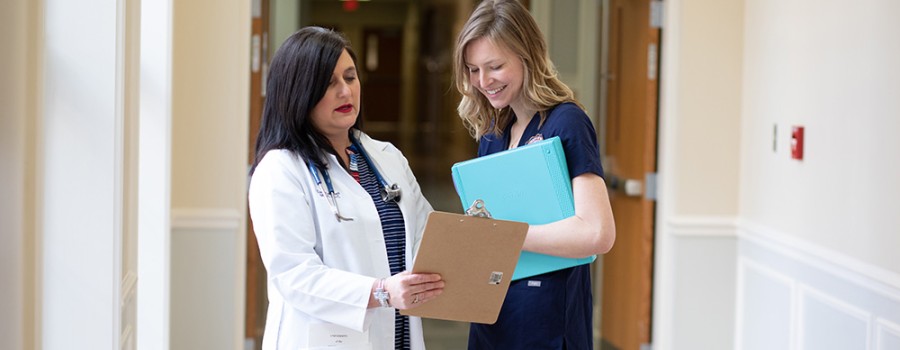Pre-Pharmacy: Because the world of medicine needs, well, medicine.
Chemistry and biology are inextricably linked. Master that link, and you can change uncountable lives for the better. By rounding out your undergraduate education with a pre-pharmacy program that offers a specialized focus in your areas of interest, you will build momentum toward a rewarding career in healthcare or other sciences.
By the Numbers
$128,570
2%
1 in 5
16:1
Programs & Requirements
* The credit hours listed on this page only reference the specific program requirements and is not reflective of the total hours necessary to receive your degree. Cumberlands requires all students obtain a minimum of 60 hours for an associate’s degree and a total of 120 hours for a bachelor’s degree. Transfer and prior learning credits may be counted toward those totals.
To learn more about our General Education Requirements, please visit the page referenced below or explore our Academic Catalog.
The rewards of a pharmacy or natural sciences career path are vast. You don’t have to work in a health clinic to help sick or injured patients feel better. By supporting patient health and wellbeing as a pharmacist or medical researcher, you are serving patients in a life-changing way! People in roles like that contribute to vital medical discovery and innovation. Critical drugs that offer symptom relief – or even cures for diseases – were developed by trained professionals in the pharmaceutical field. With a pre-pharmacy degree from Cumberlands, you’ll be on your way to becoming a professional like that.
If you want to pursue a career in the pharmacy world, check into the pre-pharmacy degree track at University of the Cumberlands. Our pre-professional health program is just what the doctor ordered to fulfill the 60 hours of pre-pharmacy undergraduate work that most pharmacy schools require for admittance.
Course Requirements
Students interested in applying to medical, dental, or veterinary school are strongly encouraged to complete these courses. It is important to review the admissions requirements requirements for each program to which you will apply because the prerequisites for admission may be slightly different among professional schools.
- BIOL 331 - Vertebrate Embryology
- BIOL 342 - Parasitology
- BIOL 345 - Microbiology
- BIOL 346 - Biochemistry
- BIOL 436 - Medical Biochemistry
- BIOL 441 - Immunology
- BIOL 442 - Comparative Anatomy
- BIOL 443 - General Physiology
- BIOL 445 - Molecular Biology
- BIOL 446 - Advanced Cell Biology
- BIOL 447 - Histology
This option is recommended for students entering a “blended” area such as pre-professional medically related areas (medicine, dentistry, pharmacy, physician assistant, physical therapist, etc.), chemistry/business, and chemistry/biology.
MATH 140, MATH 240, PHYS 241, and PHYS 242 are prerequisites for some upper-level chemistry courses.
- CHEM 132 - General College Chemistry I
- CHEM 111 - General Chemistry Laboratory I
- CHEM 232 - General College Chemistry II
- CHEM 211 - General Chemistry Laboratory II
- CHEM 331 - Organic Chemistry I
- CHEM 321 - Organic Chemistry Laboratory I
- CHEM 332 - Organic Chemistry II
- CHEM 322 - Organic Chemistry Laboratory II
- CHEM 336 - Analytical Chemistry
- CHEM 328 - Analytical Chemistry Laboratory
- CHEM 441 - Physical Chemistry I with Laboratory
- CHEM 434 - Inorganic Chemistry
- CHEM 490 - Senior Research Project
- CHEM 491 - Selected Topics in Chemistry
A Bachelor of Arts degree requires completing the same courses as a Bachelor of Science with the addition of completing one foreign language sequence through the intermediate level.
- FREN 131 Elementary French I
- FREN 132 Elementary French II
- FREN 231 Intermediate French I
- FREN 232 Intermediate French II
- SPAN 131 Elementary Spanish I
- SPAN 132 Elementary Spanish II
- SPAN 231 Intermediate Spanish I
- SPAN 232 Intermediate Spanish II
Take the Next Step
Mission and Goals
The mission of the pre-pharmacy program at University of the Cumberlands is to provide the knowledge and skills that will prepare you for medical school and help you succeed in various fields of service in healthcare and related sciences.
Pre-Pharmacy Careers & Outcomes
All stats from U.S. Bureau of Labor Statistics
Clinical Pharmacist: $128,570
Clinical Pharmacist: $128,570
Pharmacists dispense prescription medications and provide information to patients about the drugs and their use.
Chemical Engineer: $105,550
Chemical Engineer: $105,550
Chemical engineers apply the principles of chemistry, physics, and engineering to design equipment and processes for manufacturing products such as gasoline, detergents, and paper.
Chemist: $79,760
Chemist: $79,760
Chemists and materials scientists research and analyze the chemical properties of substances to develop new materials, products, or knowledge.
Natural Sciences Manager: $137,900
Natural Sciences Manager: $137,900
Natural sciences managers supervise the work of scientists, including chemists, physicists, and biologists.
Clinical Research: $95,310
Clinical Research: $95,310
Medical scientists conduct research aimed at improving overall human health.
Medical Assistant: $37,190
Medical Assistant: $37,190
Medical assistants complete administrative and clinical tasks in hospitals, offices of physicians, and other healthcare facilities.
Common Questions
A pre-pharmacy degree is an undergraduate program designed to prepare students for entry into pharmacy school. It provides a strong foundation in subjects like chemistry, biology, and mathematics, equipping students with the essential knowledge and skills needed to succeed in a Doctor of Pharmacy (PharmD) program.
A pre-pharmacy degree typically takes about two to three years to complete, depending on the institution and the student's course load. Some students may choose to complete a four-year bachelor's degree in a related field before applying to pharmacy school.
While some coursework for a pre-pharmacy program might be available online, most pre-pharmacy degrees require on-campus attendance due to the hands-on nature of lab work and other practical components. It's important to check with individual institutions for specific program offerings.
Yes, a pre-pharmacy degree is worth it for students aiming to become pharmacists. It provides the necessary prerequisites for pharmacy school, where graduates can pursue a rewarding career in healthcare, with strong job prospects and competitive salaries.
A pre-pharmacy degree primarily prepares students for further education in pharmacy school. However, it can also lead to entry-level positions in healthcare, research, or laboratory settings, such as pharmacy technician, research assistant, or laboratory technician.
To obtain a pre-pharmacy degree, you must enroll in a college or university that offers a pre-pharmacy program. Complete the required coursework, which typically includes classes in biology, chemistry, physics, and mathematics. After finishing the pre-pharmacy program, you can apply to pharmacy schools to continue your education.
While a pre-pharmacy degree is specifically tailored for entry into pharmacy school, degrees in biology, chemistry, biochemistry, or other related sciences are also excellent preparation for a PharmD program. These degrees cover many of the same prerequisites required for pharmacy school admission.
Pre-pharmacy and pre-med are similar in that both are preparatory tracks for professional healthcare programs, but they are distinct in their focus. Pre-pharmacy is specifically tailored for students planning to attend pharmacy school, while pre-med prepares students for medical school and a career as a physician.
Pharmacists often major in pre-pharmacy, biology, chemistry, or biochemistry during their undergraduate studies. These majors provide the necessary science background and prerequisites needed for admission to pharmacy school.
Faculty Experts in Pre-Pharmacy
Learn more about the pre-pharmacy professors you'll be interacting with at Cumberlands.

Ms. Kara Stanley

Jeffrey Schwarz
Jeffrey Schwarz
Contact Information

Dr. Leif Deyrup
Dr. Leif Deyrup
Contact Information
Request Information
Ask us about our pre-pharmacy program today.

